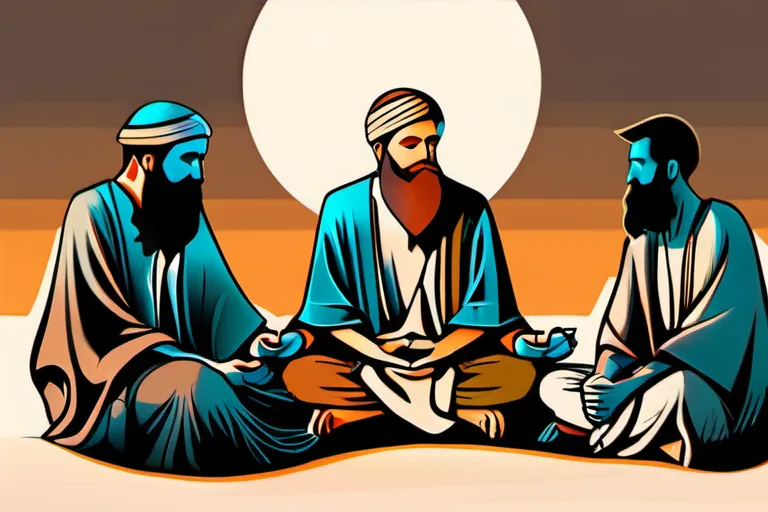Explore the essence, qualities, and functions of a spiritual guide in various traditions.
This article delves into the concept of a guru, a spiritual teacher or guide who plays a significant role in many religious and philosophical traditions. We will explore the characteristics, roles, and functions of a guru, as well as the unique relationships between gurus and their disciples.
The Historical Significance of Gurus
Have you ever pondered about the origins of spiritual guidance? How did the concept of a guru, or spiritual teacher, come to be in various traditions? In Hinduism, Buddhism, and Sikhism, the role of a guru is deeply rooted in history, yet its essence has evolved over time. Let’s delve into these historical roots.
In ancient India, guru was more than just a title; it represented wisdom passed down through generations. The word itself—guru, literally means ‘remover of darkness’ or ‘teacher.’ This signifies the profound role these figures played in guiding souls towards enlightenment. Think of the guru as a lighthouse in a stormy sea, illuminating the path to spiritual light.
In Hinduism, gurus are often revered for their deep knowledge of scriptures and practices such as meditation and yoga. They have been instrumental in preserving ancient texts like the Vedas and Upanishads. How many times have you wondered about the transmission of such wisdom from one generation to another without written records?
Buddhism brought its own twist on the guru figure, emphasizing the relationship between a master and disciple as a central part of spiritual practice. The teacher-disciple dynamic here is akin to a garden in which the seeds of enlightenment are sown and nurtured by the guiding hand of the guru. How many times have you seen this mentorship transform lives?
In Sikhism, Guru Nanak, the first Guru, started a lineage that continues through ten human Gurus, each one leaving behind teachings that continue to guide Sikhs today. The concept here is not just about imparting knowledge but also fostering a community where spiritual practices are shared and supported.
These historical contexts show us that gurus were not just teachers, but often life-changers, offering direction in both mundane and spiritual matters. They acted as guides, helping individuals navigate the complexities of existence to find their true selves.
The journey of understanding a guru’s role is like uncovering layers of an onion—each layer reveals more depth and complexity. These figures have been instrumental not just in religious practices but also in shaping cultural and social norms across different regions and times.
Characteristics of a True Guru
When we delve into the essence of a true guru, one cannot help but ask: What truly sets them apart from other spiritual leaders? Is it their wisdom alone that makes them a guru, or is there more to it than meets the eye?
In the realm of spirituality, a guru is like a lighthouse in a stormy sea, guiding souls towards the shore of enlightenment. But what are the essential qualities that define this role? Let’s explore these characteristics one by one.
First and foremost, wisdom reigns supreme. A true guru possesses an expansive knowledge that goes beyond books and scriptures. They have experienced life in its myriad forms and understand the intricacies of the human condition. This wisdom is not just academic but deeply personal, offering insights into the complexities of existence.
- Question: Can anyone acquire this profound understanding, or is it a gift that only a select few are bestowed with?
Compassion is another defining trait. A guru embodies love and empathy, reaching out to those in need not just verbally but through actions and presence. Their compassion can be felt like a warm blanket on a cold night, offering solace and reassurance.
- Question: How do we know if a guru truly practices this compassion? Is it evident in their dealings with others?
Detachment is often highlighted as a key quality. A true guru remains unshaken by the ebb and flow of life, maintaining a balanced perspective despite external circumstances. This detachment allows them to see beyond personal desires and guide their students towards self-realization.
- Question: In a world where attachment is often seen as a source of joy, can true freedom be found in detachment?
Lastly, self-realization stands at the core. A guru has transcended the limitations of their own ego and realized their connection with the divine. This realization gives them an unshakable foundation to teach others, providing a path that is both authentic and genuine.
- Question: How do we recognize when someone has achieved this profound state?
In conclusion, while these qualities may seem like lofty aspirations, they are the very essence of what makes a guru. By embodying wisdom, compassion, detachment, and self-realization, they offer more than just guidance—they provide a blueprint for living a meaningful life.
The Role of a Guru in Spiritual Guidance
Imagine a journey through a dense forest, where every step is filled with uncertainty and unknowns. A guru serves as the guide who illuminates the path ahead, helping you navigate the twists and turns. How do they provide this guidance? Through teaching, initiation, and unwavering support.
Teaching: Just like a teacher in a classroom, a guru imparts knowledge to their disciples. However, the teachings go far beyond academic lessons. They delve into the deeper realms of life, touching upon wisdom that can transform one’s perspective on existence itself. Do you ever wonder why meditation and self-reflection are so integral? A guru’s teachings offer profound insights into understanding your true nature and the world around you.
Initiation: Initiation is a significant ritual where a disciple takes a leap of faith, embracing their spiritual path under the guru’s guidance. It can be a symbolic act that signifies a new beginning or a deep-seated transformation. Have you ever wondered what it means to step into a new chapter of your life? For many, initiation with a guru marks the start of a journey towards self-discovery and enlightenment.
Support: In the arduous path of spiritual growth, support from a guru can be invaluable. A true guide is not just someone who points out directions but also walks alongside you through thick and thin. They offer encouragement during challenging times and celebrate your achievements with joy. How often do we feel alone in our struggles? A guru provides the companionship that helps us stay grounded on our path.
In essence, a guru’s role is multifaceted, offering not just wisdom but also the strength to embrace change and the courage to face challenges. They are not merely teachers but partners in your journey towards self-realization. Could you imagine walking through this forest without a guide? The presence of a guru can make all the difference between stumbling blindly or finding your way towards the light.
The Unique Relationship Between Gurus and Disciples
Imagine standing at the threshold of a new spiritual path, where the world opens up like a rose petal to reveal the inner beauty and complexity of life. At this juncture, the figure of a guru emerges as a guide, much like a lighthouse guiding ships through treacherous waters. But what exactly is the unique relationship between a guru and their disciple? How does devotion, respect, and trust intertwine to form this dynamic bond?
In many spiritual traditions, a guru serves as more than just a teacher; they are seen as a father or mother figure who nourishes the soul. The disciple’s journey is like walking through a dense forest, where every step requires guidance and wisdom. How does one navigate this path with devotion? Devotion to the guru is akin to planting a seed of faith that grows into a tree of understanding and enlightenment.
The relationship between a guru and their disciple is built on a foundation of respect, much like how you would treat a wise elder in your family. This respect isn’t just for authority; it’s an acknowledgment of the immense knowledge and experience the guru possesses. Yet, this respect must be balanced with trust, ensuring that the disciple can freely explore and question without fear of judgment. Trust, like a fragile flower, needs to be nurtured gently but firmly.
Consider the metaphor of a garden where each plant symbolizes different aspects of spiritual growth. The guru is like the gardener who knows exactly when to water or prune, ensuring that all plants thrive in harmony. Through their guidance, the disciple learns not just what to do, but how to live with purpose and meaning.
In this journey, the role of a disciple goes beyond mere obedience; it’s about seeking knowledge, understanding, and ultimately, finding one’s own path. The guru-disciple relationship is a tapestry woven from threads of wisdom, respect, trust, and devotion. Together, they create a bond that can withstand the tests of time, much like the steadfast roots of an ancient tree.
Controversies Surrounding Gurus
Have you ever wondered why some people have such an unwavering faith and devotion towards their gurus? It’s like they possess a special kind of magnetism that draws people in, almost as if by some invisible thread. But what exactly is a guru and what role do they play in our lives?
A guru, often referred to as a spiritual guide or teacher, holds a position of immense respect and reverence across various traditions. From the ancient wisdom of Indian traditions to the mystical practices of Sufism, gurus are seen as conduits between the divine and humanity. They are not just teachers but often embody a life force that inspires and transforms their followers.
The role of a guru is multifaceted and can vary widely depending on the tradition. In some cases, they act more like healers, offering remedies for physical and emotional ailments through ancient knowledge and practices. Others serve as spiritual architects, guiding souls towards enlightenment or inner peace. Yet, even in these varied roles, one common thread remains: the guru’s primary function is to facilitate growth and understanding.
But just how do we navigate the complexities of a guru-disciple relationship? Are gurus merely benevolent figures or could they sometimes be sources of controversy? Historically, there have been instances where allegations of misconduct or exploitation have tarnished the image of some gurus. It’s a delicate balance, for when a spiritual guide crosses ethical boundaries, it can lead to serious consequences not just for themselves but also for their followers.
So, how do we ensure that the guru-disciple relationship remains healthy and transformative? Perhaps by questioning openly and seeking clarity about their teachings and intentions. After all, the journey of spirituality is one of self-discovery, and it’s crucial to stay vigilant and engaged in our spiritual quest.
The role and characteristics of a guru are complex and rich with meaning. They are beacons of light guiding us through life’s challenging paths. As we explore the controversies surrounding them, let us also remember that their essence lies not just in the title but in the profound impact they have on those who walk alongside them.
The Legacy of Gurus in Modern Times
Have you ever wondered how ancient wisdom finds its way into modern times? Gurus, those revered spiritual guides from various traditions, play a pivotal role in shaping our understanding and practice of spirituality today. In a world where technology often dictates our interactions, how do gurus maintain their relevance and impact?
Imagine a lighthouse in the vast ocean of human existence; the guru serves as that guiding beacon. Whether it’s Buddhism with its concept of guru, meaning teacher or guide, or Hinduism where the guru is seen as a bridge between the individual and the divine, the role remains fundamentally the same—providing light in the darkness of ignorance.
But what qualities define a true guru? Is it merely someone who claims to have profound spiritual insights, or does one need to possess certain attributes that set them apart? A guru should be wisdom personified, offering not just teachings but also personal transformation. They must embody the values they espouse and inspire their followers with their actions.
How do gurus influence contemporary spirituality in the digital age? Consider how social media platforms have given rise to modern-day spiritual leaders who reach millions instantly. Yet, these new voices raise questions about authenticity and the potential for exploitation in this fast-paced environment. Are we merely consumers of spiritual content, or can we learn to be co-creators of our own enlightenment?
As we navigate through the complexities of modern spirituality, gurus continue to hold a unique position. They are both custodians of ancient wisdom and pioneers of new thought. The legacy they leave behind is one that challenges us to seek deeper understanding not just of ourselves but of the world around us.
Conclusion
 By the end of this article, you will have gained a deeper understanding of the role and importance of a guru in various spiritual traditions. You will also be equipped with knowledge to recognize and appreciate the guidance that a guru can provide on your own spiritual journey.
By the end of this article, you will have gained a deeper understanding of the role and importance of a guru in various spiritual traditions. You will also be equipped with knowledge to recognize and appreciate the guidance that a guru can provide on your own spiritual journey.











